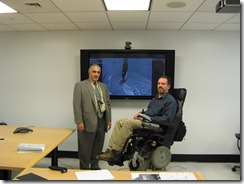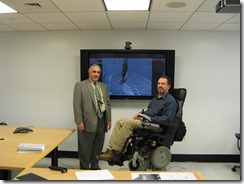 Everyone wants to know how I’m doing after my CCSVI procedure. The answer is…I feel exactly the same as I did before my visit to Dr. Sclafani. That may sound like bad news, but maybe it is, and maybe it isn’t.
Everyone wants to know how I’m doing after my CCSVI procedure. The answer is…I feel exactly the same as I did before my visit to Dr. Sclafani. That may sound like bad news, but maybe it is, and maybe it isn’t.
Some people are personally invested in my outcome because they know me and care about me. Others are following my story because I represent another data point in what has become a global, open laboratory experiment. Our collective lab notes can be found at CCSVI websites, on Facebook, Twitter, YouTube, TIMS, and at a place we affectionately call the Blogosphere.
So I sit here and wonder- have the blood flow characteristics in my central nervous system improved enough to alter the course of my MS? Unfortunately, I have no answer today. As soon as I do have a clue, one way or the other, you’ll be the first to know (well, right after I tell Kim).
Before trying to evaluate the success or failure of my CCSVI procedure, I decided to re-read my earlier blog posts, so that I could be reminded of what my expectations were. I’m glad I wrote them down, because expectations are notoriously fluid over time. Here’s some of what I wrote, from the oldest post to the most recent:
“…people like me who have already suffered significant damage to our central nervous systems will not see much, if any, improvement in our current conditions. We would simply stop getting worse. I need to stop getting worse, like, yesterday. Getting better can wait.”
“This concept has such upside potential that I find myself temporarily disinterested in all other MS research. For the moment, everything else is just so much background noise to me.”
“Given the speed at which my MS is progressing, patience puts me at more risk than taking early action does. CCSVI remains my best chance to halt the progression of this disease before it completely consumes me.”
“Although I am very encouraged by the possible connection between CCSVI and MS, I have to be realistic about the chances that this will make a difference in my life. In other words, I am managing my expectations. This is how I operate. Others, in a similar situation, might effuse optimism. To each his own. Perhaps this will slow down or stop the progression of the disease. Maybe it won’t help at all. But one thing is certain. If I do nothing, then I know where this thing is headed.”
“No miracle changes on the operating table. It may take me many months to assess the impact. No matter the final results, it was a most interesting experience.”
“How am I doing, you ask? I’m doing just fine, thank you. Ask me again in six months or a year, and I may be able to tell you if this procedure had any positive effect on my disease progression. Wouldn’t that be something?”
“Because it may be a long while before I know if this CCSVI treatment helped my disease progression or not, I’m unsure of how to comport myself. Should I carry on as if I’m cured or as if I’m still sick?
That’s a trick question. Forgive me. The answer is the same no matter the outcome of my CCSVI treatment. To the best of my ability I’m going to live my life one day at a time, hope for the best, prepare for the worst, and treat each day as if it could be my last. I encourage each of you to do the same.”
 Several themes stand out in these earlier posts. First, I had modest and realistic expectations. Although there have been many accounts from CCSVI patients about immediate improvements, as a person with advanced PPMS I had no expectations in that regard. I only hoped to stop the progression. Second, before I had CCSVI treatment I felt that it would take six months or a year to assess its impact. It’s only been twelve weeks. Third, even if I see no benefit from CCSVI treatment, I will not regret having tried.
Several themes stand out in these earlier posts. First, I had modest and realistic expectations. Although there have been many accounts from CCSVI patients about immediate improvements, as a person with advanced PPMS I had no expectations in that regard. I only hoped to stop the progression. Second, before I had CCSVI treatment I felt that it would take six months or a year to assess its impact. It’s only been twelve weeks. Third, even if I see no benefit from CCSVI treatment, I will not regret having tried.
Since March 17th, I have seen no improvements. I expected none. Over the same time period I have experienced no disease progression. I expected none. Twelve weeks is simply too short of a period to notice disease progression for me.
There are two potential story lines, either one of which may be playing out right now:
- The procedure had no positive effect on my disease progression.
- The procedure slowed or stopped my disease progression.
 A third scenario may be overlaid on either of these though, just to complicate matters. It may be that the repair was not permanent. The stenosis that was opened using angioplasty may have returned (restenosis). I expect to have a follow-up visit with Dr. Sclafani at six months, which will be September of 2010, to determine if the areas of stenosis have remained open. I’ll have this exam whether or not I believe my disease progression has stopped.
A third scenario may be overlaid on either of these though, just to complicate matters. It may be that the repair was not permanent. The stenosis that was opened using angioplasty may have returned (restenosis). I expect to have a follow-up visit with Dr. Sclafani at six months, which will be September of 2010, to determine if the areas of stenosis have remained open. I’ll have this exam whether or not I believe my disease progression has stopped.
For me, then, it remains a waiting game. Is the uncertainty difficult to bear? Sure it is. However, it’s preferable to the grim certainty I would have faced if I had tried nothing at all (and ‘nothing at all’ is exactly the recommended course of action by many physicians and other experts, none of whom walk in my shoes).

Mitch,
Thanks for the update. I also have often wondered how you were doing post surgery and if you had experienced any benefits, but every time I thought about asking I reminded myself that it was none of my business and that you would post anything that was significant. I commend you on your handling of this matter. I find it refreshing not to have to wade through gobs of minute details of encouraging symptoms that are often retracted later or never verified. I for one think that you are conducting yourself just fine and that "one day at a time….each day as if it could be your last" thing is good by me.
Charlie
Thanks for your update! I too, have had questions with what is going on in my body post-procedure. Are we restenosing.. or is continued or new pain part of the healing process? No one seems to have answers. But I do agree with you in saying that we had to try something — waiting around with the "what if treatment could help" was just not bearable. Keep hanging in there!
thank you and especiallly your pragmaism, I will have the procedure because I think it will or may protect my healyhy upper body, I don't think it will change my failed legs and bladder they are too far gone. but slowing it down or protecting me a bit is a big plus for my kids my job as mum isn't done yet
as someone who is going in for testing, and hopefully the procedure, in a couple of weeks i have been trying to be realistic about my expectations of the outcome. your post really helped – it certainly summarizes how i feel. i just often forget and get carried away when i read about all the positive outcomes for so many people. i am going to read this post everyday until i go for the test… thank you!
I find the way you are dealing with your liberation outcome realistic, logical and fair. In fact, i see this exactly like you do.
Hang in there. You did the right thing. Let s wait and see. Together.
Charlie,
My story is quite boring compared to others…but it is what it is.
Dawna,
Isn't it frustrating that the medical community is trying to "protect us" from "dangerous" procedures, as if we are children who cannot weigh the risks vs. the potential benefits?
Ciara,
I think your expectations are quite reasonable. Good luck.
Anonymous,
Best of luck with your procedure!
Mitch
Hi Mitch,
Thanks for posting this, will be interested to hear more as it unfolds.
Love,
Herrad
Your postings provide my wife and me with more data points with which to play the hand we were dealt. We are so very grateful for your willingness to provide a first hand perspective.
With our best wishes
A Fellow Mainer